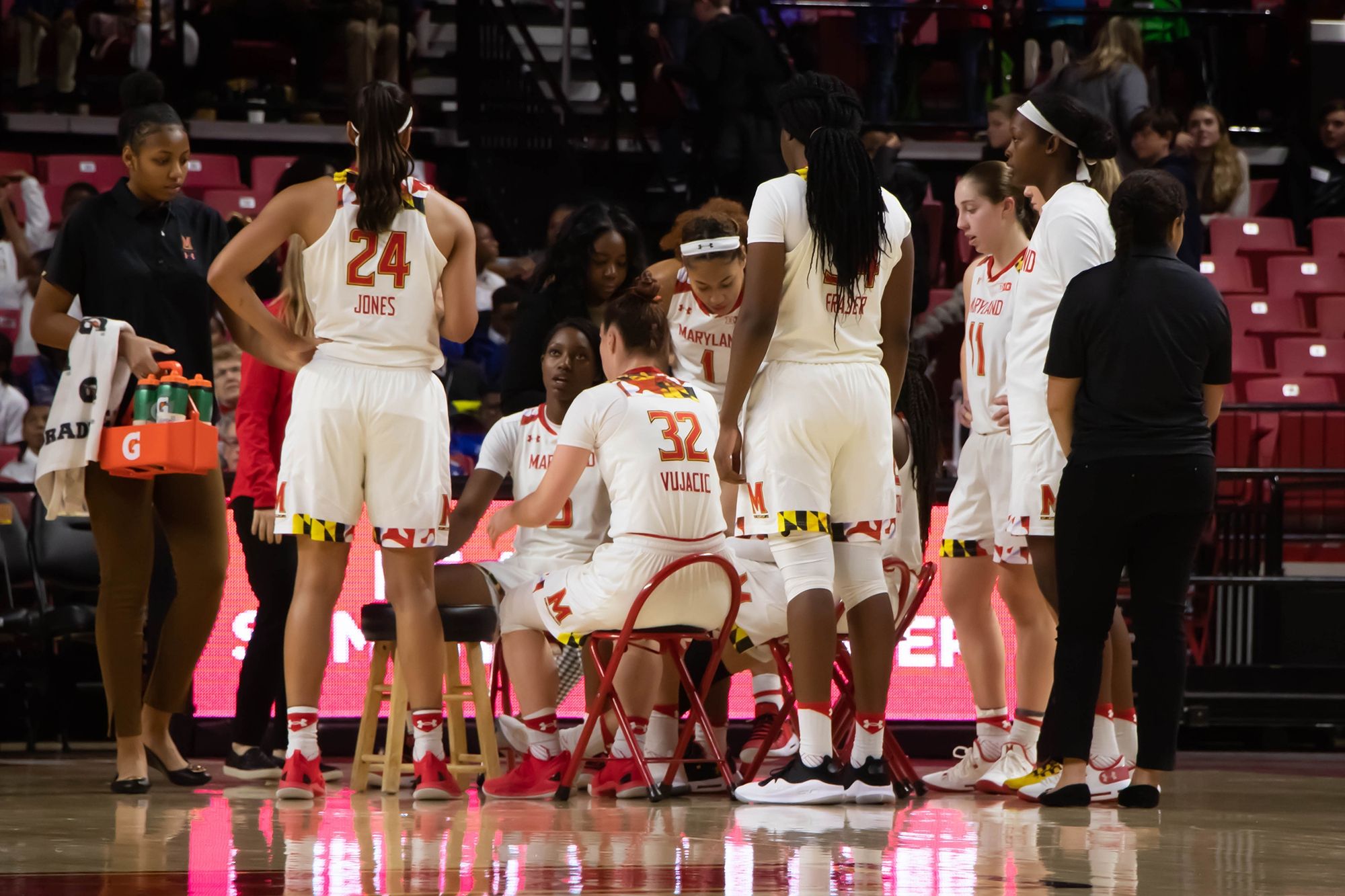Maryland women’s basketball introduced a new drill Wednesday. It simulated fighting through screens to close out on three-point attempts and boxing out the shooter if they missed.
In No. 4 Maryland’s 73-65 upset loss to Rutgers on Monday, the Terps conceded 19 offensive boards — many of which were due to missed assignments — and the Scarlet Knights exploited the Terps’ soft perimeter defense to convert 9-of-21 shots from behind the arc.
The drill, called “eagle rebounding,” was implemented by coach Brenda Frese to correct the defensive inconsistencies that came to light in the defeat.
And though Maryland’s next opponent, Ohio State, is having a down year, Frese knows her team must quickly correct its shortcomings in order to get back on track Saturday against the Buckeyes.
“I knew at some point [these issues] were going to catch us,” Frese said. “We’ve always out-talented people, and this has been an Achilles heel in our practice for a really long time.”
[Read more: Turnovers, rebounds doom Maryland women’s basketball in 73-65 loss to Rutgers]
In the first quarter against the Scarlet Knights, Maryland’s highly touted defense was repeatedly exposed by the underdog visitors.
Rutgers entered the game averaging 4.7 threes per contest, but after just 10 minutes, the Scarlet Knights were a blistering 5-for-8 from deep. And against a Maryland (12-1, 1-1) squad that had allowed just 52.8 points per game in its 12-0 start, ranking 12th in the NCAA, Rutgers scored 28 points in the first 10 minutes.
[Read more: No. 4 Maryland women’s basketball separates late from Penn State in 77-61 win]
However, the biggest surprise arguably came on the glass, where the usually dominant Maryland frontline struggled to secure Rutgers’ few opening-quarter misses. Of the nine shots the Scarlet Knights didn’t convert in the first period, they rebounded five of them.
Guard Ciani Cryor, who entered the game averaging just 1.7 rebounds a game during her career, secured five boards on the offensive glass alone.
The 5-foot-5 point guard consistently crashed the paint following long-range misses, and failed Maryland rebounding assignments allowed her to grab a career-high nine boards against one of the best rebounding teams in the country.
“We have to make a decision that we’re going to fix that piece that’s getting exposed,” Frese said, “or it will continue to rear its ugly head.”
And even when Maryland tightened its defense — it gave up only 19 points and one three-pointer over the next two quarters — the Scarlet Knights continued to dominate the glass. Rutgers finished with a 15-7 advantage in second-chance points.
Despite facing a Maryland team that had out-rebounded its first 12 opponents by 17.0 boards a game prior to Monday, which tied for second nationally, the Scarlet Knights didn’t shy away from the glass. They finished with a 38-28 rebounding edge.
“A lot of our focus in practice was rebounding,” said Scarlet Knights forward Stasha Carey, who had a team-high 18 points and added six boards against the Terps. “We made sure we were blocking out. It doesn’t matter big or little, everybody’s blocking out.”
For the second straight game, the Terps went most of the second half without forward Shakira Austin, their leading rebounder, and were outrebounded 20-12 after halftime.
Austin paces Maryland with 11.5 boards a game, but against Rutgers, she played just three minutes after halftime. Against Penn State, Frese similarly held the 6-foot-5 post player to only two minutes following the break.
Frese cited the increased physical nature of the Big Ten as the primary reason for holding the talented freshman out in the second half. But with the Terps struggling to lock down misses, Maryland will need Austin down low to shore up its suddenly inconsistent defense.
And with three other Big Ten squads ranked in the top 20 of the AP poll, and the Buckeyes 4-7, 0-2 Big Ten) coming to town Saturday, Maryland must solve its rebounding and three-point defensive problems.
“You can’t out-talent people anymore,” Frese said. “You have to be better in your execution, you have to be better defensively. But it is exciting because this is what you want the conference to be. You want great games that are going to make you better come March.”



